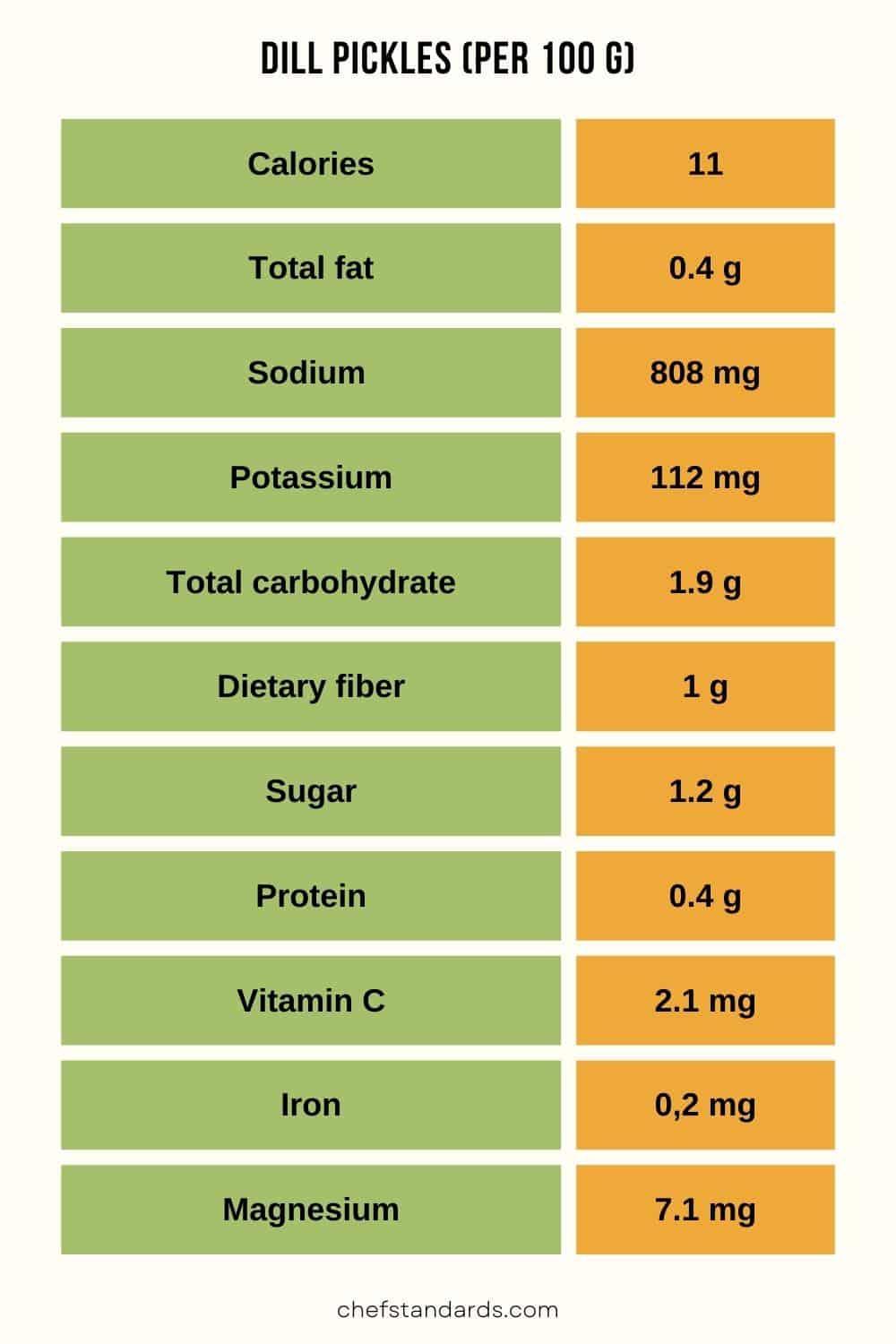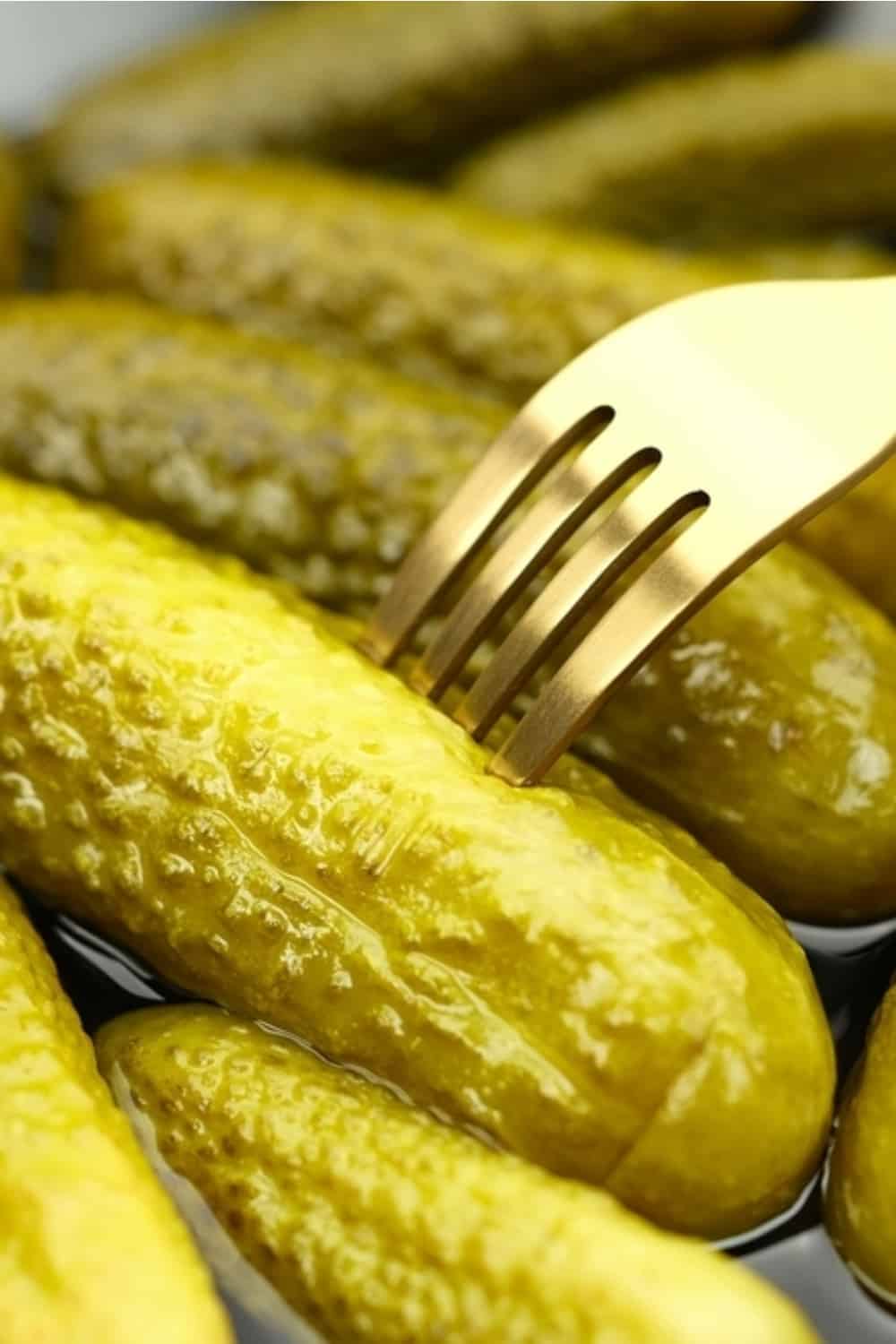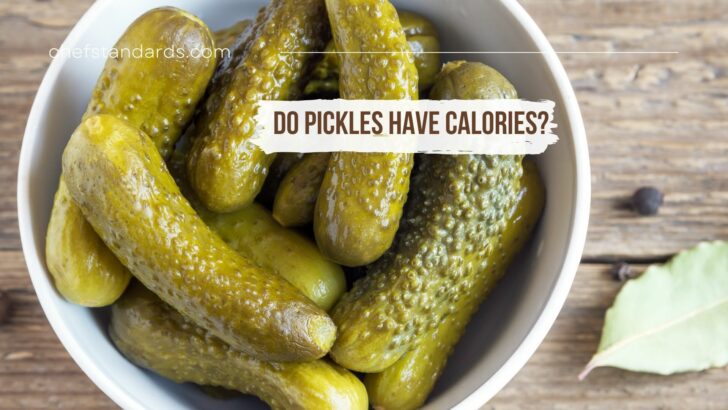I used to be one of those people who think that pickles don’t have calories because they’re cucumbers in salt water and vinegar. Boy, was I wrong!
THE TRUTH REVEALED: Pickles are one of those “zero calorie” foods that actually have calories.
So, if you’re on a diet and trying to lose some weight, eating a large number of pickles might not be a good idea not just because of “calories” but for health reasons as well.
Are you ready to bust the myth of ‘pickles and calories’? Let’s do this!!
How Many Calories Do Dill Pickles Have?
There are many types of pickles, and dill pickles are the most common ones. They are usually made of dill seeds (or dill weeds, in some cases), vinegar, and water mixed with salt with possible variations in different recipes.
Dill pickles of different sizes/weights have different amounts of calories. (At least, that’s what the logic says.) So, let’s see how many calories dill pickles have according to their size and weight:
• 1 dill pickle slice (7g) = 1 calorie
• 1 dill pickle spear (30g) = 3 calories
• 1 small dill pickle (37g) = 4 calories
• 1 medium dill pickle (65g) = 7 calories
• 100 grams of dill pickles = 11 calories
• 1 large dill pickle (135g) = 14 calories
• 1 cup of dill pickles (155g) = 16 calories
Nutritional value of dill pickles per 100 grams
Besides calories, we should also pay attention to the nutrients found (or not found) in dill pickles. I was not-so-pleased about the fact that many pickle brands add sugar and food coloring to pickles. According to the USDA, here’s what 100 grams of dill pickles will give to your body:

Other Types Of Pickles
Cucumbers can be pickled in brine, vinegar, or some other solution which gives them a unique taste and a different total number of calories. From sour to candied pickles, here’s how many calories per 100 grams different types of pickles have:
• Sour (or half-sour) pickles (100 grams) = 11 calories
• Gherkins (100 grams) = 14 calories
• Bread and butter pickles (100 grams) = 91 calories
• Polish pickles (100 grams) = 32 calories
• Hungarian pickles (100 grams) = 21 calories
• German pickles (100 grams) = 17 calories
• Lime pickles (100 grams) = 131 calories
• Kool-aid pickles (100 grams) = 26 calories
• Cinnamon pickles (100 grams) = 127 calories
• Candied pickles (100 grams) = 143 calories
How Many Pickles Should You Eat Per Day?
The amount of pickles you can eat per day greatly depends on your age, weight, activity level, and other factors.
As a general rule, you should eat no more than 2 to 4 servings a day. (One serving should be a one-half cup of pickles.) However, if you’re pregnant or breastfeeding, then you should modify the recommended amount in agreement with your doctor.
No matter how enticing eating an entire jar of pickles sounds, it is definitely not recommended. Why? Because pickles contain high levels of salt and vinegar.
Too much salt can raise your blood pressure. Also, “just one large dill pickle has more than 2/3 of the ideal amount of sodium an average adult should have for the whole day”, as stated by WebMD.
Eating a large number of pickles can potentially cause discomfort in your abdominal area or other digestive issues. This hypothesis is not only supported by healthcare providers but it’s also based on my personal experience. 💁♀️
Do Pickles Have Any Health Benefits?

Yes, they do! Here are some health benefits linked to consuming pickles (in moderate amounts, of course):
• Pickles help maintain a healthy gut: Fermented pickles are loaded with probiotics, also known as good bacteria. Needless to say that these probiotics help regulate our immune system.
• They also fight diseases: Cucumbers contain a large amount of beta-carotene which our body converts into vitamin A. Now, what does this beta-carotene do for our body? It helps lower the risk of dying of stroke, cancer, heart disease, and others.
• Pickles help reduce oxidative stress: Pickles have antioxidant properties because they contain high amounts of vitamins E and C. Such and similar antioxidants help protect our body’s cells from oxidative stress.
• They relieve muscle cramps: Apparently, pickle juice can help replace lost electrolytes and ease muscle cramps after a workout. However, more evidence is needed to support this thesis.
• Pickles help regulate blood sugar levels: The vinegar found in pickle juice is responsible for regulating blood sugar levels.
This is of course if you don’t pair them with some heavy-weight sandwich as they are one of the best sides for sandwiches.
Are pickles good for weight loss?
Are you a pickle lover by nature but have a strong desire to lose weight? The struggle sounds familiar to me!
Sorry to disappoint you, but you shouldn’t eat pickles with the goal to lose weight. Even though pickles don’t have that many calories, they’re loaded with salt.
Too much salt in your diet can result in water retention (when your body is unable to maintain fluid levels). Water retention causes swelling of your body parts and general discomfort.
To put it simply, too much salt in your diet regimen signals your body to produce more water. As a result, the excess water ends up “being stuck” in your body.
Another thing to keep in mind is that the added preservatives in pickles can cause bloating which is miles away from your desired goal (read: weight loss).
Any More Questions?
Now that we’ve covered how many calories pickles have, their nutritional value, daily intake, health benefits, and their negative role in weight loss, I’m quite sure that I’ve answered all your questions.
However, I’ll use this opportunity to remind you to be moderate when consuming pickles no matter how delicious they are to your taste buds! 😊

